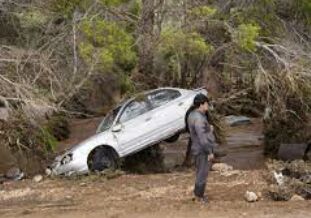Thousands Dead and Missing: Libya's Deadly Storm Exposes Crumbling Infrastructure and Political Divide
A deadly storm in Libya has caused widespread destruction, highlighting the country's crumbling infrastructure and lack of a climate strategy. Political divisions and rival administrations have further hindered rescue efforts, leaving thousands of people in need of aid. The floods underscore the numerous challenges faced by Libya, including social unrest, economic struggles, and a lack of investment in key areas. Immediate aid must be provided, but a comprehensive approach is necessary to address the underlying issues and rebuild for a more stable future.
A devastating storm in Libya has led to the deaths of thousands of people and left many more missing, marking the most fatal environmental disaster in the country's modern history. The floods highlight the vulnerability of Libya's crumbling infrastructure, which has been further exacerbated by years of war and lack of a central government. Shockingly, Libya is the only country yet to develop a climate strategy, according to the United Nations. The city of Derna in eastern Libya has been particularly devastated by the storm, with large sections of riverside buildings washed away after two dams burst. The destruction in Derna is evident in videos showing water gushing through the remaining tower blocks and overturned cars, as well as bodies lined up on sidewalks for burial.
The moment of flood hits Derna in Libya. #Flood #Libya #Derna pic.twitter.com/VUTIVZfVjW
— JournoTurk (@journoturk) September 11, 2023
Residents describe the lack of a warning system or evacuation plan, with the only indication of danger being the sound of the dams cracking. However, the challenges in providing aid to those affected are not solely due to environmental factors. Libya has been divided between rival administrations since 2011, following the NATO-backed Arab Spring uprising that toppled former ruler Muammar Qaddafi. The internationally recognized government is based in Tripoli, headed by Prime Minister Abdul Hamid Dbeibah, while the eastern administration, backed by military commander Khalifa Hiftar, operates from Benghazi.
Despite separate pledges to assist in rescue efforts, the two governments have a history of failed cooperation and have struggled to unify. The political divide in Libya is further complicated by the support of regional and world powers. Hiftar's forces have backing from Egypt, Russia, Jordan, and the United Arab Emirates, while the Tripoli-based administration receives support from Turkiye, Qatar, and Italy. Rescue operations have been hindered by severed roads and logistical challenges, but also by the need for rival authorities to approve aid access to the most affected areas. The lack of coordination and mistrust between the two governments poses significant obstacles to the delivery of much-needed assistance.
The recent floods in Libya add to a long list of challenges faced by the country. Protests erupted last month following news of a secret meeting between the Libyan and Israeli foreign ministers, with demonstrators calling for Prime Minister Dbeibah's resignation. Additionally, sporadic fighting between rival militias demonstrates the continuing influence of armed groups throughout Libya. The country has become a major transit point for migrants fleeing conflict and poverty, and human traffickers have taken advantage of the instability. Meanwhile, Libya's rich oil reserves have done little to benefit its population, as conflict and security threats have severely impacted oil production. The city of Derna, once known for its scenic white beachfront houses and palm gardens, has suffered neglect since the ouster of Qaddafi in 2011.
It became a hub for extremist groups and experienced airstrikes and sieges by various forces. Reconstruction and investment in the city have been limited, with most of its modern infrastructure dating back to the Qaddafi era. Suspicion and a lack of independence from authorities have hindered efforts to rebuild the city. Overall, the devastating storm in Libya has laid bare the country's vulnerabilities and challenges, ranging from infrastructure decay and political divisions to social unrest and economic struggles. The immediate focus must be on providing aid to the affected areas and ensuring better preparedness for future disasters. However, a comprehensive approach is needed to address the underlying issues and rebuild Libya for a more stable and prosperous future.




